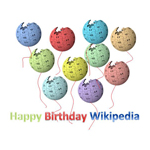 As its turns 15, Wikipedia is the sixth most popular website in the U.S. and seventh in the world. As it grows older, the number of articles, pages and reference increase at an immense speed. And for that particular reason, people should be worried.
As its turns 15, Wikipedia is the sixth most popular website in the U.S. and seventh in the world. As it grows older, the number of articles, pages and reference increase at an immense speed. And for that particular reason, people should be worried.
At its 2015 state, Wikipedia has 291 editions, more than 5 million articles English-language articles, over than 38 million articles in over 250 other languages. With more than 7000 new pages created each day, and billions of page views coming from its monthly hundreds of millions of unique visitors, Wikipedia is also one of the most-linked-to website on the planet.
Wikipedia is so large that it would take more than 21 years for a normal person to read the English-language pages alone.
While those stats are indeed a massive achievement for a 15 year old website. By any measure, Wikipedia is truly remarkable. It's seen as a real wonder of the digital age that homes far larger information than any other body of collected knowledge.
And as a non-profit organization, Wikipedia is also free. It's life is supported by donations from small donors who love to learn.
Launched on January 15th, 2001 by Jimmy Wales and Larry Sanger, it seeks in creating a summary of all human knowledge in the form of an encyclopedia. For Wales, his humanitarian vision has always been the driving force behind Wikipedia. The goal, he says, is to create a world in which "every single person on the planet is given free access to the sum of all human knowledge."
With big vision and huge achievement, what else does Wikipedia needs? While the site has gotten much of its fame as human knowledge advances, throughout its life, Wikipedia is facing a growing pain that grows within itself.
What does this mean to Wikipedia? To some, this won't matter much. But to others that really seek valid data, the declining number of editors means a large portion of Wikipedia contains articles that are incomplete, poorly written, need citations for verification and insufficiently researched.
Wikipedia has a declining number of human editors. Because of that, the constantly increasing number of articles can pose many problems. One of which is authenticity.
Defending Human Intelligence and Knowledge

A 2013 article in the MIT Technology Review laid out Wikipedia's crisis:
"The volunteer workforce that built the project’s flagship, the English-language Wikipedia - and must defend it against vandalism, hoaxes, and manipulation - has shrunk by more than a third since 2007 and is still shrinking. Those participants left seem incapable of fixing the flaws that keep Wikipedia from becoming a high-quality encyclopedia by any standard, including the project’s own.
The problem, most researchers and Wikipedia stewards seem to agree, is that the core community of Wikipedians are too hostile to newcomers, scaring them off with intractable guidelines and a general defensiveness. One detailed study from 2012 found that new editors often find that their first contributions to the site are quickly rejected by more experienced users, which directly correlates with a drop in the likelihood that they will continue to contribute to the site."
A research concluded that 12 percent articles in a random sample had some documented problems. Wikipedia's volunteers and editors are mainly male and Western. To simply put, the less diverse they are, the more they are siding with one while opposing others (race, religion and gender).
Related: Wikipedia - Howard University
Reviews from science articles found that Wikipedia's level of accuracy is similar to Encyclopedia Britannica's. But it exhibits a huge systematic bias, mixture of "truths, half truths, and some falsehoods." Some of its controversial and sensitive topics are prone to manipulation and spin.
Wikipedia is still evolving. While it certainly achieved the state it wants, it's still far from implementing what it should when concerning declaring information. The site indeed succeed in having quantity of information that none other encyclopedia, documented pages and printed media can cover, but in terms of quality, there are still a lot of weakness holes.
Wikipedia is human-driven, and always will be. People may have used bots or artificial intelligence software to edit others' work, and Wikipedia itself is still perfecting the ways of directing new, well-intentioned editors to pages in need of improvement, where they're most likely to be able to make lasting contributions.
While Wikipedia could and should survive to moments to come, its survival depends on new types of editors. They are the natural products that can change the needs of the site. The efforts to automate the quality edits still rely on human editors and the community that do volunteer for the greater goods.